Questionhi,
i bought a rottweiler puppy 6 week old which is my first puppy.it has been one week since i bought her .i had some problems and got considerable changes with answers from another expert.she used to do aggressive biting(growling and snaping)and barks and tries to bite when picked up.doesnt allow to be scratched under the belly.i used spray bottle to correct her biting and gives her very very loud(literally shouitng)
no when she barks when picked up.things have changed and but she hasnt stopped yet.
my questions are...
1.I TAUGHT HER THE SIT COMMAND AND THE COME COMMAND AND SHE LISTENS PERFECTLY WHEN I HAVE HER FOOD IN MY HANDS.(I TRAIN HER BEFORE HER MEALS)AFTER SHE IS FULL,SHE DOENT LISTEN AND ITS AS IF SHE DOENT WANT ME TILL THE NEXT MEAL.COMPLETELY IGNORES ME.WHAT TO DO TO MAKE HER LISTEN TO COMMAND ALWAYS.I TRAIN HER COMMANDS 4 TIMES A DAY AND I STARTED 5 DAYS BACK.I PRESUME THAT SHE KNOWS THE COMMAND BY NOW.
2.I BOUGHT HER AT 6 WEEKS.I KNOW THAT SHE HAS MISSED VALUABLE LESSONS FROM HER MOTHER AND LITTERMATES BUT I COULDNT HELP IT.
HOW CAN I TEACH HER THE SOCIAL ORDER OF THE PACK AND MAKE HER KNOW THAT I AM ALPHA AROUND THIS PLACE?I EAT BEFORE SHE DOES WALK OUT IN AND OUT OF THE DOOR FIRST DOESNT ALLOW HER TO SIT ON COUCH OR SLEEP WITH ME IN BED.BUT THESE THINGS ONLY WORK WITH DOGS WHO HAVE BEEN TAUGHT THE PACK ORDER BY THEIR MOTHER RIGHT?
AnswerThe obedience training you are doing is one of the best ways to let her know you are the leader. Keep the sessions short to match her attention span, only a few minutes at a time. As you are seeing, they learn quickly at that age with several short sessions a day. Be sure and include leash work. Setting the pace and choosing where to go and keeping her on task all reinforce your place as leader.
Feeding can be a powerful teaching time. Make her sit quietly before adding food to her dish or putting it down. She doesn't eat until you say ''Free dog.'' You will have to hold her with one hand at first, but she will learn.
Try these exercises: ''Elevation for small puppies: Sit on the floor and gently put your hands around your pup's middle, below his front legs, and lift him up. He is facing you. Hold him for 15 seconds. Repeat until he no longer struggles. If he is past 10-12 weeks, lift his front feet off the ground, but don't pick him up.
Cradling for small puppies: Hold your puppy gently on his back, as you would cradle a small baby. If he struggles, hold him firmly until he quiets for 10-15 seconds. With larger pups, you can do this as your sit on the floor, with your pup between your legs.
Quiet lying down: Place your pup on the floor on his side, with all 4 legs pointing away from you. Use your hands on his neck/shoulder area and middle, to hold him in this position. When he is quiet, praise him. Lengthen the time that you keep him quietly in this position. When he accepts this position well, handle his paws and muzzle, while keeping him quiet.''
The quotes mean this isn't my original work. It is copied from my Puppy Raising Manual. I have long used these or minor variations of them, and they are very effective. You may want to give him a belly rub while he is on his back too. Helps bonding. There is a big difference between him rolling over and demanding a belly rub, and you choosing a time to roll him over and rub his belly. The latter cements your place as pack leader.
Don't worry about the 6 weeks. It is better than the 12 weeks many insist on. Puppies have learned much of what they will from their mother and littermates by 6 weeks and are ready to start learning to live in the human world. The period between 6-12 weeks is a dangerous time. One sniff where a sick dog relieved itself in the last 6 months can bring on parvo or another life threatening disease. Fail to expose it to strangers, including men, women, children, noise, etc. and you could end up with a misfit you can't take out in public. They also need continuing contact with other dogs, but it must be limited to ones you know are getting good care. See http://www.apdt.com/po/news/docs/Messer_Nov06.pdf
The spray bottle is not the best way to teach her not to bite. Young Labs, which I know best, and other puppies tend to very bad about biting. You see a litter of them, and all the ones that are awake are biting another one or themselves. I am not even sure they realize that when they are alone, if they quit biting, they would quit being bitten. At 3 to 4 months they are getting their adult teeth, and it seems they spend every waking moment biting or chewing. One thing you can do at that stage is to knot and wet a piece of cloth. Then freeze it. The cooling will soothe the gums. Only let the puppy have it when you are there to watch it. I maintain a Lab's favorite chew toy is another Lab. Otherwise they settle for any person they can. They keep hoping to find one that won't yelp, jerk their hand away, and leave.
You just have to keep on correcting them, hundreds of times, not dozens. Provide sturdy, safe toys such as Kongs and Nylabones. Avoid things they can chew pieces off and choke on them. Keep them away from electrical cords. Crates are essential for most young Labs and other dogs.

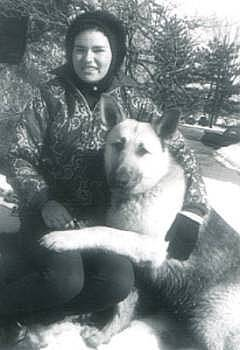 What dog is right for me?
QuestionHi,
my name is Miriam and I am 12 years old.
What dog is right for me?
QuestionHi,
my name is Miriam and I am 12 years old.
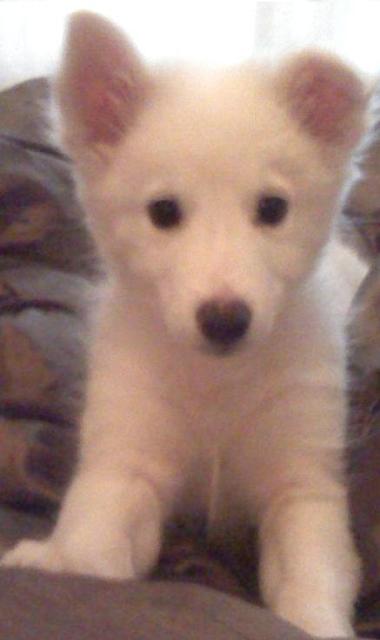 New Eskimo puppy
Question
Honey the shy american
I just got my 10 week o
New Eskimo puppy
Question
Honey the shy american
I just got my 10 week o
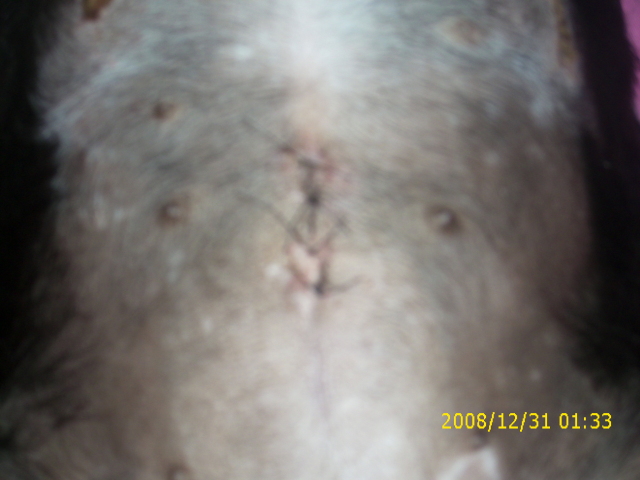 I want to know how to remove my dogs spay stitches and the right way.
Question
this is the area that
I need to know how to r
I want to know how to remove my dogs spay stitches and the right way.
Question
this is the area that
I need to know how to r
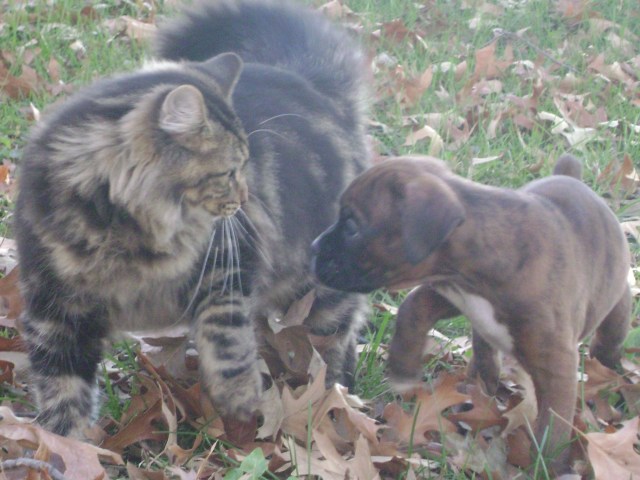 Puppy wont come
Question
Capone & Rascal
Help! My seven week
Puppy wont come
Question
Capone & Rascal
Help! My seven week
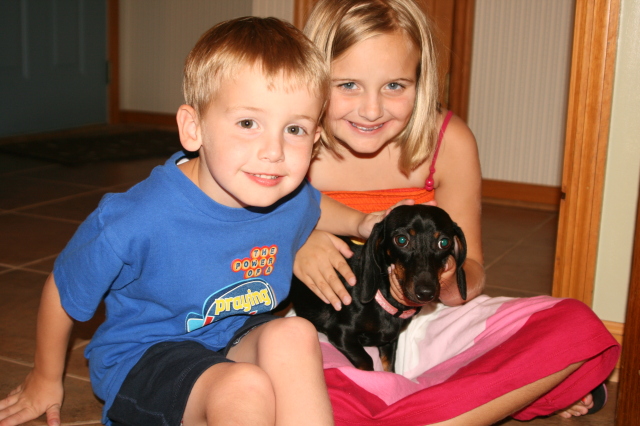 1 year old daschund
Question
our new member
We recently got a one year old
1 year old daschund
Question
our new member
We recently got a one year old